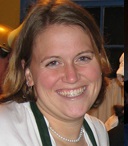Science Festival interview with Dr Amy Pedersen
Dr Amy Pedersen in the School of Biological Sciences studies the complexities of parasite-borne infections in the real world, in which organisms are usually infected by multiple parasites at once, and where parasites can cause infection in several different species.

Your area of research, parasite diseases, might seem off-putting to some people. What are the best and worst aspects of working in this field?
Nearly every organism on the planet is infected with at least one parasite species at some point in its lifetime, and it has been estimated than nearly half of all species are parasitic in nature. The overall aim of my research is to better understand the role that parasites play in natural populations including wildlife, domestic animals and humans. The goal of gaining a more ecological understanding of parasites is to better control the infectious diseases caused by parasites. To answer these questions, I use a combination of approaches including both field and laboratory experiments, combined with theoretical and mathematical modelling approaches. The best aspect of work in this field is that the results of our research have the potential to impact disease control strategies that may mitigate the effects of parasites on individuals and host populations. The most difficult aspects of my research are that many of our experiments can take months to years to conduct, as we are often interested in understanding how a host population responds to a parasite or drug treatment. This research is done in the wild, and so we experience all types of adverse weather and it takes significant tenacity to see the experiments through to their end.
What do you hope the audience will get out of being at your event?
My hope is the audience will learn about the vast diversity of parasites that exist in nature, and importantly, will understand that parasites may not always be bad for their host individual or host population. I will specifically discuss my research on wild animal populations, in which we find that different parasite species can interact within a host, and that these interactions can impact host health and disease control. I will also share some research involved in understanding when and which parasites may emerge to cause future health threats for humans and wildlife.
What are the biggest research challenges in your area of study?
One of the biggest research challenges that I face in my research involves linking the results of controlled laboratory studies with the dynamics and complexity of natural populations. In the lab, we can minimise variation in the hosts, parasites and environment, but it is often very difficult to then translate those findings to the wild, where heterogeneity – a diverse mix – is the norm. We try to address this challenge by moving between the wild and the lab, but it remains an important issue at the forefront of effective disease control.
What might surprise people about ongoing research into parasite infections?
I find that many people are surprised by the diversity of parasite types and parasite biology found in the wild. For example, we know that more than1400 species of parasites have been found in infect humans. In addition, many people tend to be surprised that even for parasite species for which we have effective treatments such as drugs or vaccines, that many of these species still commonly infect humans, domestic animals and wildlife around the globe and have significant negative health impacts.
What do you hope to get out of taking part in the Science Festival?
My hope in taking part in the ‘Bad Ways to Die’ panel is to be able to share my fascination in understanding the amazing diversity of parasites and parasite biology that exist in the natural world. In addition, I would like to engage with the audience by introducing some of the research that we are conducting at the University and to hear what interests them the most and what questions they would like to have answered.
Event Details
Bad Ways To Die will take place at 5.30pm on Thursday 12 April in the Anatomy Lecture Theatre, Summerhall
Book tickets for 'Bad Ways to Die' on the Science Festival website

